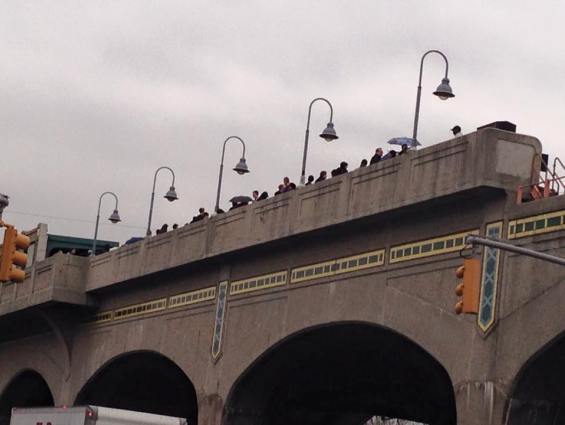
July 2, 2015 By Jackie Strawbridge
Any straphangers who have been left stranded by the 7 train, or squeezed into one of its cramped cars, can come sing the 7 Train Blues at Sidetracks next weekend.
The grassroots organization 7 Train Blues was formed this spring in response to a series of delays, shutdowns and overcrowded trains on the line. Members document their travel troubles and call for improved service, with an eye towards Western Queens’ infrastructure needs as population continues to grow.
Since its founding, a Facebook group for 7 Train Blues has collected more than 1,000 members.
On July 10 from 6 p.m. to 8 p.m., the organization will hold its first group-wide community event at Sidetracks, 45-08 Queens Blvd. The evening is both an outreach event for new members and an opportunity for existing members to meet and chat.
“When the group started a couple of months ago, I was a little surprised at how many people joined initially. Clearly, we’ve hit a nerve,” Pete Mauro, a member of the group’s steering committee, said. “This and other events will be geared towards increasing those numbers.”
The Sidetracks meet-up will coincide with an awareness campaign at the neighboring 46th Street station, also from 6 p.m. to 8 p.m. 7 Train Blues will hand out flyers regarding service problems along the line.
According to Mauro, the predominant travel woes cited by the group’s members include weekend shutdowns between Queens and Manhattan, daytime shutdowns for track work, and what he called “massive crowding” on train platforms during the morning rush hour.
Next week’s event will not be the first community gathering inspired by 7 train troubles. In March, Councilman Jimmy Van Bramer held a rally under the tracks in Sunnyside calling for the MTA “to publicly release detailed information about every service disruption over the last year.”
“In New York especially, it’s such a big City, it seems that you need to speak with a collective voice if there is an issue of concern in your area,” Mauro said. “It’s not just a single person griping, but it’s a real systemic problem along an entire subway line.”
However, Mauro added, 7 Train Blues is committed to keeping “a positive tone.”
“It’s not so much about we want to attack the MTA, as we want to find a solution to those problems,” he said.
For the 7 Train Blues Facebook Page click here
11 Comments







The mafia? Thats a stupid comment. When the city runs things they can ruin a wet dream. Look at otb. How could they lose money? Idiots. 7train is like riding a train in a 3rd world country. Its disgusting. Gross.
Xenaphobe.
There’s no point in protesting. You can’t fight the mafia, and it’s mafia-controlled construction companies who are paying off MTA officials to hold trains up so they can use cranes to build more luxury towers for pasty, flip-flop wearing nerds from places like Michigan and Minnesota to relocate into.
Take your meds.
Hey it’s not us. It’s just the 7 being the 7.
i’d rather organize a class action lawsuit against the MTA for not providing services while taking my money.
7 train much better in summer when kids out of school. Come September things will most likely return to normal.
The 7 train has been much better lately.
Prob be impossible to find parking when this meetup happens…
So then just take the tra– oh.
Take the 7 train